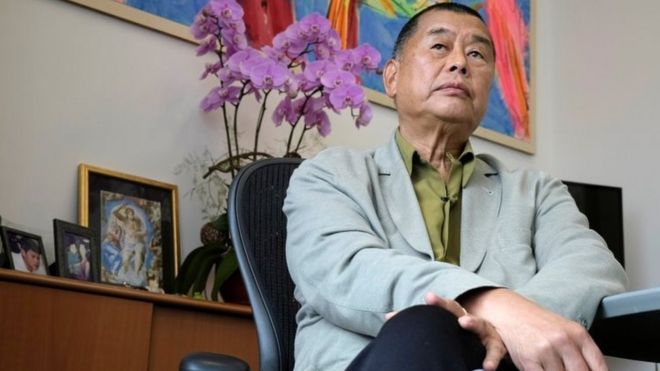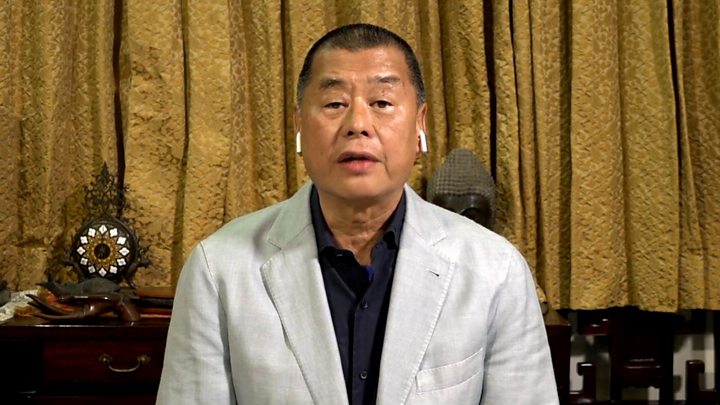Hong Kong pro-democracy tycoon Jimmy Lai arrested
 REUTERS
REUTERSHong Kong business tycoon Jimmy Lai has been arrested for suspected collusion with foreign forces, his aide has said.
Mark Simon said the businessman was held under the controversial national security law imposed by China in June.
Mr Lai has been a prominent supporter of the pro-democracy protests that erupted in Hong Kong last year.
In February, the 71-year-old who also holds UK citizenship was charged with illegal assembly and intimidation. He was later granted police bail.
- Hong Kong security law: What is it and is it worrying?
- The Hong Kong residents ready to leave for the UK
"Jimmy Lai is being arrested for collusion with foreign powers at this time," said Mr Simon, an executive at Mr Lai's media firm Next Digital.
According to local media, Hong Kong police have also entered the building of his media company, searching the offices.
Police have confirmed that seven people were arrested on Monday on suspicion of breaking the national security law, but have not yet named Mr Lai.
The Monday arrests are the third wave of detentions under the new law. Mr Lai's would be the highest profile case so far and the first involving someone who holds foreign citizenship.
Who is Jimmy Lai?
Mr Lai is estimated to be worth more than $1bn (£766m).
Having made his initial fortune in the clothing industry, he later ventured into media and founded the newspaper Apple Daily, which is frequently critical of Hong Kong and mainland Chinese leadership.
He has also been himself an activist against Beijing's increasingly tight grip on the Hong Kong. In 2019 he supported the reform protests and participated in the demonstrations.
When earlier this year he was charged for his involvement in those protests, Chinese state media dubbed him a "riot's mastermind" who "has spread waves of hatred and negative information about the Chinese mainland day and night".

On 30 June, when the security law was passed, Mr Lai told the BBC that this "spells the death knell for Hong Kong".
He warned that Hong Kong would become as corrupt as mainland China because "without the rule of law, people who do business here will have no protection".
In a separate interview with the AFP news agency, Mr Lai said: "I'm prepared for prison. If it comes, I will have the opportunity to read books I haven't read. The only thing I can do is to be positive."
What is the new security law?
Hong Kong has had a high degree of autonomy since it was returned to Chinese rule in 1997, and its residents have had a far higher level of freedom of speech and media than people on the mainland.
But the law's key provisions include that crimes of secession, subversion, terrorism and collusion with foreign forces are punishable by a maximum sentence of life in prison.
It makes it easier to punish protesters, and reduces the Hong Kong's autonomy.
It also gives Beijing powers to shape life in the former British colony in a way it has never had before.
Critics say it effectively curtails protest and freedom of speech - China has said the new law will return stability to the territory after a year of unrest.




No comments:
Post a Comment